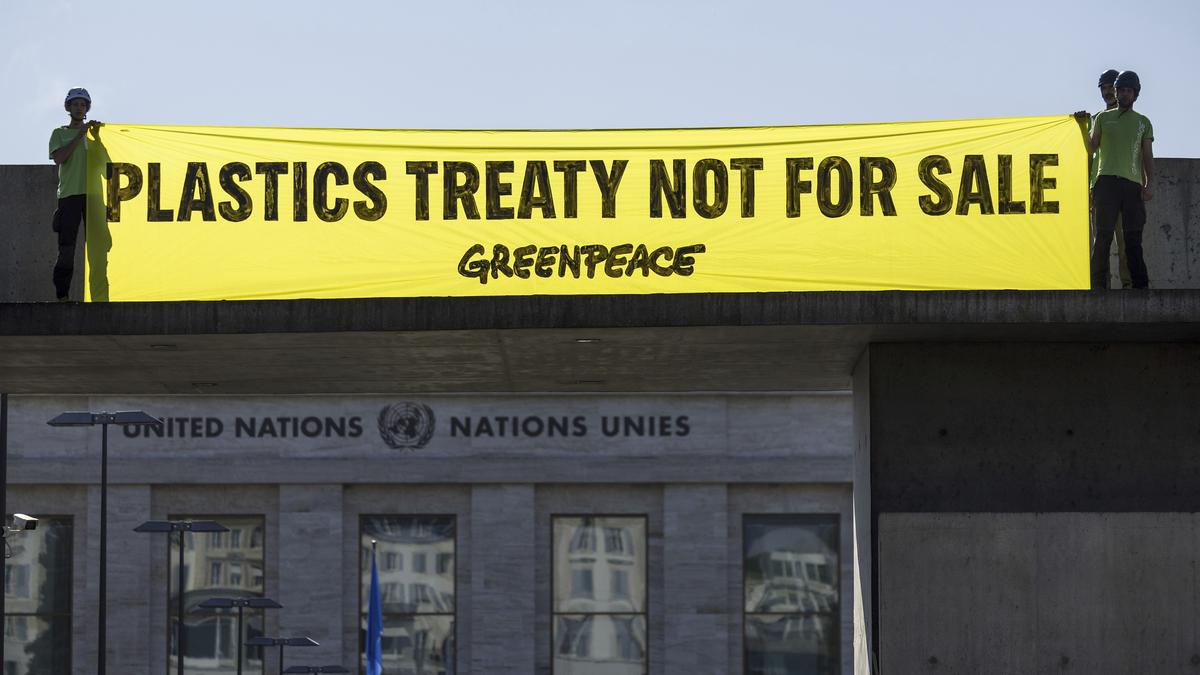Science
Countries Express Disappointment Over Plastics Treaty Draft

On the penultimate day of negotiations aimed at finalizing a global treaty on plastic pollution, many countries expressed their disappointment over a draft agreement that does not include crucial limits on plastic production. The current proposal has drawn criticism for primarily catering to a minority bloc, which includes several Arab states and India, that has consistently opposed production caps in favor of alternative measures to tackle plastic waste.
Luis Vayas Valdivieso, the Chair of the proceedings, acknowledged the diverse opinions presented by various delegations. “This represents my best attempts to consolidate various positions that have been expressed through various delegations and groups,” he stated. He emphasized that the draft is still open for discussion, suggesting that changes might be made as talks progress.
Kuwait’s delegation has publicly supported the draft, with Naresh Gangwar, who led the Indian team, expressing a willingness to engage in further dialogue. “We support the statement made by Kuwait. While there are some improvements that we can suggest, we are happy to discuss this,” he remarked.
The draft’s reception has not been universally positive. Sebastian Rodriguez, a delegate from Colombia, was the first to voice strong opposition, stating, “The proposed draft text is entirely unacceptable and we cannot use it as a basis for negotiations.” His comments were met with applause, reflecting widespread frustration among many countries. “Our red lines and that of the majority of the members of this hall have been spat upon. This is not simply about closing a treaty at any cost but about closing a wound that has hurt our oceans and our livelihood. We need a new text,” added Juan Carlos Monterrey Gomez, the delegate from Panama.
Around 80 member states voiced their disapproval, highlighting a significant divide in the negotiations. Abdulrahman Al Gwaiz, the delegate from Saudi Arabia, noted, “This text is a milestone that demands some reflection. However, there are points that we need some balance between various articles in the text.” His statement resonated with both petrochemical countries and members of the Indian delegation, indicating a complex landscape of interests.
Independent observers have also expressed dissatisfaction with the draft. Swathi Seshadri, a petrochemicals specialist at the Institute for Energy Economics and Financial Analysis (IEEFA), criticized the draft for failing to address the entire life cycle of plastics. “The text does not fulfill the mandate of resolution 5/14 as it does not address the full life-cycle of plastics. There is also no attempt made to reduce plastic dependency through mandating reuse and refill systems. This text is lopsided and will do nothing, even at the level of downstream waste management to address plastic pollution,” she stated, warning of serious implications for the global economy, environment, climate, and health.
David Azoulay, representing the Centre for International Environmental Law, also condemned the draft, claiming it undermines years of consultative efforts. “The new Chair’s text makes a mockery of a three-year-long consultative process that showed broad support for an ambitious plastics treaty that addresses the full life-cycle of plastics, including production,” he argued. Azoulay further criticized the draft for offering only weak, voluntary measures, which he believes will not lead to meaningful change.
As negotiations continue, the outcome remains uncertain. The divergence in opinions highlights the complexity of reaching a consensus on how to effectively tackle plastic pollution while balancing the interests of various nations. The next stages of dialogue will be critical in determining whether a more comprehensive agreement can be achieved.
-

 World5 months ago
World5 months agoSBI Announces QIP Floor Price at ₹811.05 Per Share
-

 Lifestyle5 months ago
Lifestyle5 months agoCept Unveils ₹3.1 Crore Urban Mobility Plan for Sustainable Growth
-

 Science4 months ago
Science4 months agoNew Blood Group Discovered in South Indian Woman at Rotary Centre
-

 World5 months ago
World5 months agoTorrential Rains Cause Flash Flooding in New York and New Jersey
-

 Top Stories5 months ago
Top Stories5 months agoKonkani Cultural Organisation to Host Pearl Jubilee in Abu Dhabi
-

 Sports4 months ago
Sports4 months agoBroad Advocates for Bowling Change Ahead of Final Test Against India
-

 Science5 months ago
Science5 months agoNothing Headphone 1 Review: A Bold Contender in Audio Design
-

 Top Stories5 months ago
Top Stories5 months agoAir India Crash Investigation Highlights Boeing Fuel Switch Concerns
-

 Business5 months ago
Business5 months agoIndian Stock Market Rebounds: Sensex and Nifty Rise After Four-Day Decline
-

 Sports4 months ago
Sports4 months agoCristian Totti Retires at 19: Pressure of Fame Takes Toll
-

 Politics5 months ago
Politics5 months agoAbandoned Doberman Finds New Home After Journey to Prague
-

 Top Stories5 months ago
Top Stories5 months agoPatna Bank Manager Abhishek Varun Found Dead in Well









